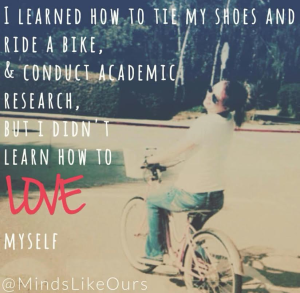“You know those moments where someone perfectly puts words to something you’ve been feeling but haven’t named?
That moment happened for me when I was sitting in the conference room at Invisible Children three years ago and a guest speaker was talking about insecurity. It wasn’t even his main point, but I will never forget when he off-handedly said, “You can’t invest in others if you don’t invest in yourself.”
It struck me. It felt as if he had just given me permission to embrace something that I had felt stirring within me. At that point, I had been working for the organization for 5 years, and I was exhausted. I loved my job and the organization, believed in the mission, and was surrounded by the most incredible community, but I was worn down. I couldn’t understand why I felt continually tired and overwhelmed when I knew I was doing the job I was supposed to be doing.
And here’s what it came down to: I was putting myself last. The tendency in the nonprofit world is to always put the cause above ourselves. It’s easy to forget to prioritize self-care when you are doing something you feel is more important. I had been working crazy hours and pouring most of my energy into my job, and I was doing it without putting much thought into what was fueling me.
I know this is not just true in the nonprofit world. My friends that are new parents struggle to find any time for themselves when their kids demand all their attention, and students are taught to achieve in order to get into college or to land a good job, often forgetting to take care of themselves. Somehow, as a culture, we’ve come to view rest as weakness and self-care as selfish and unnecessary.
None of that is wrong. Working for a cause, working hard in school, and being there for your child are all wonderful things. But I believe it is time for a shift in our mentality. When we take time for ourselves, when we prioritize balance, and when we cultivate other interests, we are better for it.
Studies show that we are 20 percent more productive when we work from a happy state of mind, as opposed to a negative, stressed, or even neutral state. When we are energized, we are equipped to tackle the game-changing tasks instead of just checking our inbox. We’re better prepared to solve problems, to overcome obstacles, to make the hard decisions, and to innovate.
Every now and then, let’s trade practicality for play and work for balance. Think of it as preparation for the next season in life where your life or your family or your job demands a lot from you. You need to be your best in those times. You need to show up. So, for now, let’s free ourselves of the guilt of having to always be busy because busyness just masquerades as productivity.
It doesn’t need to be overwhelming. Here’s where you can start:
1. Go back to the basics. Feed your mind and body with nutritious food. Stay hydrated and get enough sleep. Get outside for a few minutes if you’re stuck in an office all day. Be active, even if that just means choosing the stairs over the elevator.
2. Incorporate a daily ritual. We all can find an extra 15 minutes a day to invest into ourselves, whether that means waking up a little earlier, cutting out some wasted time at work, or getting off Instagram for a little bit. Begin or end your day with something that energizes you – maybe it’s journaling, taking a brisk walk, reading poetry, practicing yoga, or just making coffee and letting your mind be still.
3. Find time to cultivate larger interests outside of work. If you don’t know where to start, go back to what you loved when you were young. If you were a bookworm like me, join a book club. If you miss sports, join a kickball league. These activities remind us who we are.
4. Learn how to say no. This was the hardest thing for me, as a recovering people pleaser living with FOMO (Fear Of Missing Out). I challenge you to think of your time to recharge as sacred. Put it on your calendar if you need to, and don’t allow it to get pushed to the bottom of your priority list.
Repeat after me: I will be a better [student / friend / leader / spouse / professional / parent] if I take care of myself.
Great. Now go be amazing.”
To Write Love On Her Arms
twloha.com






